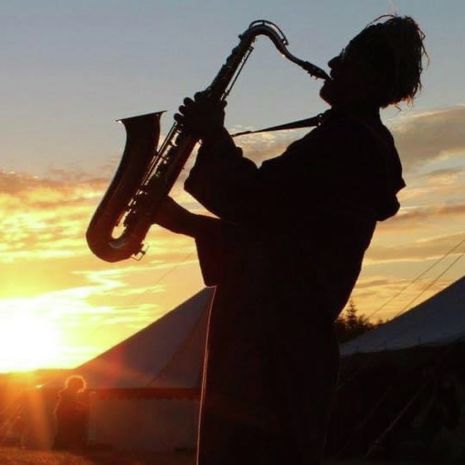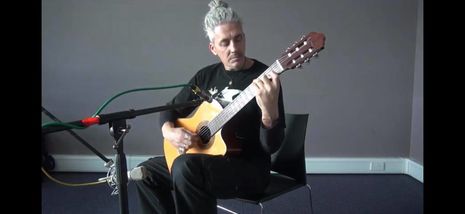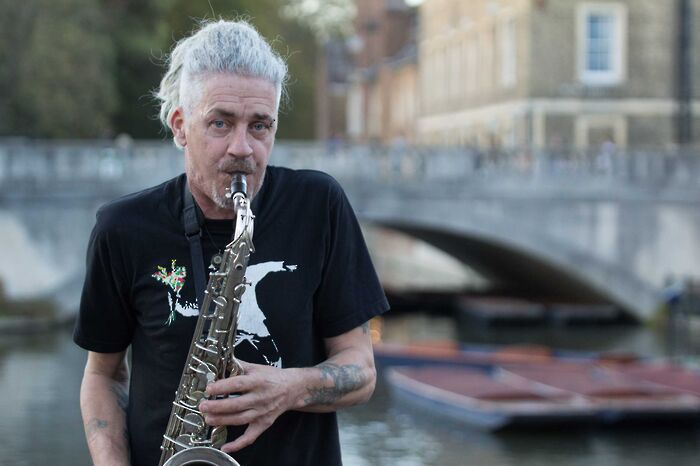From a life behind bars to Cambridge University
Christian Austin speaks with Olivia Millard about his extraordinary life transitions: from prison, to music, and then all the way to Cambridge.

CN: Brief mention of child-abuse, violence and drug-use
Having spent a total of 10 years in prison, Christian Austin became well-acquainted with the prison officer saying “See you next week!” every time he finished a sentence and left jail. But ultimately he managed to defy these expectations, not just by breaking out of a cycle of crime that had defined most of his life, but by starting at the University of Cambridge at the age of 55. As he tells me his remarkable story of going from “crazy, violent, drug-infested beginnings” to completing an undergraduate degree at Cardiff University – and then an MPhil in Criminology at Cambridge – it’s easy to see why he became a hit in Darwin College Bar (or DarBar, as he fondly remembers it). Each story he tells is characterised by his good humour, honesty and determination.
“... in prison I just ended up meeting all the guys I knew from care homes, I stepped straight into a hierarchy and I already had a place there.”
Christian was born in South West London, but grew up on a council estate in Hampshire following his parents’ divorce. He was raised by his single mother, but not before he had experienced significant physical abuse from his father, who was an alcoholic. With violence a recurring theme throughout his childhood, Christian developed an aggressive streak and this trait inevitably manifested itself in the playground, where he started to get into trouble. Several decades of run-ins with the law began at the age of 6, when he stole a bicycle whilst bunking off school. Between the ages of 12 and 15, Christian spent his time being put in, and subsequently escaping from, various care homes; he estimates having absconded 30 times over a period of 3 years. He laughs as he remembers his escapades, on one occasion making it all the way to the Isle of Wight, but his tone becomes more serious as he recalls passing one of the island’s jails: “we were looking at the prisons knowing that was where we were going, later on.”

From what Christian says, certain parallels emerge between the care homes and the prisons he encountered, not just in terms of the hierarchical environment, but also the individuals inside. As he describes his experiences of witnessing abuse within the care system, specifically the molesting of children by members of staff, Christian confesses that he was spared this abuse because of his status as the “tough guy.” He acknowledges the irony of being “very lucky” due to his violent nature, suggesting the contradictions at play. This becomes clear too as Christian describes his years in prison, beginning with a sentence at Borstal youth detention centre aged 15. He remarks “in prison I just ended up meeting all the guys I knew from care homes, I stepped straight into a hierarchy and I already had a place there.”
From Borstal, Christian began a 20-year period of going from one prison sentence to another. Feeling as though he had “all the time in the world,” while inside, he explains the choice that every prisoner is faced with : “You can either sit and stare at the wall every day, for months or years, ’cos no one’s gonna make you do anything, but I just read. I read, and read, and read.” Beginning with counter-culture books “you know, skinhead culture, Hell’s Angels, etc.” he read everything he could and decided to educate himself, inspired by his mother, moving onto works by Dumas, Hardy and Solzhenitsyn. He covered all the subjects he had missed out on by not attending school, from History and Geography to English Literature and Philosophy.
“so many of those incarcerated are ‘not only prisoners within a brick wall, but also within their own minds, because they don’t have the capacity to read or write’.”
I ask whether he was among a minority of prisoners who devoted as much time to reading, knowing that around 50% of prisoners in the UK have a literacy age of an 11-year-old (coinciding with the age when many children start to play truant). He expresses regret that so many of those incarcerated are “not only prisoners within a brick wall, but also within their own minds, because they don’t have the capacity to read or write.” It seems that reading while incarcerated is not only in a prisoner’s interests in terms of improving their future prospects by gaining an education, but also as a form of escapism from the monotony of prison life. For Christian, it was also about learning new skills, especially one that would change his life: music.
During his time in care he learnt “a few tunes” on a piano, but it was whilst he was serving time that he taught himself to read music, from a book. Armed with this theoretical knowledge, he picked up a guitar three years later during a spell in Dartmoor Prison, and started to play. He smiles as he remembers “I wasn’t even able to finish my breakfast before playing a tune!” Music has since played a big part in Christian’s life – he plays the saxophone, the guitar and sings – and music in prisons would later become the subject of his dissertation whilst at Cardiff University.
“He spent 9 months in a rehabilitation centre, and describes enduring a process which ‘breaks you down […] until you’re a clean sheet of paper’.”
Having left prison for what would be the last time, aged 35, Christian found himself at a crossroads, and with the futures of his children in mind, he decided to “sort [him]self out.” When leaving prison on previous occasions, he had encountered a “tsunami” of crime and drugs when returning back to his hometown that made it difficult to desist from reoffending. This time, he decided to move to another city in order to avoid these temptations. He spent 9 months in a rehabilitation centre, and describes enduring a process which “breaks you down […] until you’re a clean sheet of paper.” He credits the help he received there as a strong source of empowerment in helping him rebuild his life. Following redundancy from his job in construction as a result of the economic crisis of 2008, he decided to apply for university, and secured a place to study music at Cardiff. While researching for his dissertation, he came across an article by a Cambridge criminology professor that particularly resonated with him, and he got in touch with her. On her encouragement, he applied for a place at Cambridge.
I ask Christian whether he was open about his past as an ex-heroin addict and ex-convict once he arrived at Darwin, given the prejudices that these labels unfortunately elicit. He explains that he gradually started to tell people, and laughs as he remembers his “celebrity status”; people saw his past not as something to be ashamed of, but as a measure of his achievement. Christian maintains that his year spent studying at Cambridge was the best year of his life, and he enjoyed it so much that he stayed on an extra year working as a member of the Darwin catering staff.
Since leaving Cambridge, Christian has been busy: he has given a TED Talk, performed with his saxophone, lived in Georgia for a year, sold pizzas, started work as a construction foreman, and begun writing his memoir. At the end of the day, he says, it’s about your own locus of control, whether you want to be the “architect of your own destiny or whether you’re content with being tossed about aimlessly like a cork on the waves.”
 News / Colleges charge different rents for the same Castle Street accommodation2 March 2026
News / Colleges charge different rents for the same Castle Street accommodation2 March 2026 News / King’s hosts open iftar for Ramadan3 March 2026
News / King’s hosts open iftar for Ramadan3 March 2026 Theatre / Lunatics and leisure centres 4 March 2026
Theatre / Lunatics and leisure centres 4 March 2026 News / Angela Merkel among Cambridge honorary degree nominees27 February 2026
News / Angela Merkel among Cambridge honorary degree nominees27 February 2026 News / News in Brief: waterworks, wine woes, and workplace wins 1 March 2026
News / News in Brief: waterworks, wine woes, and workplace wins 1 March 2026








